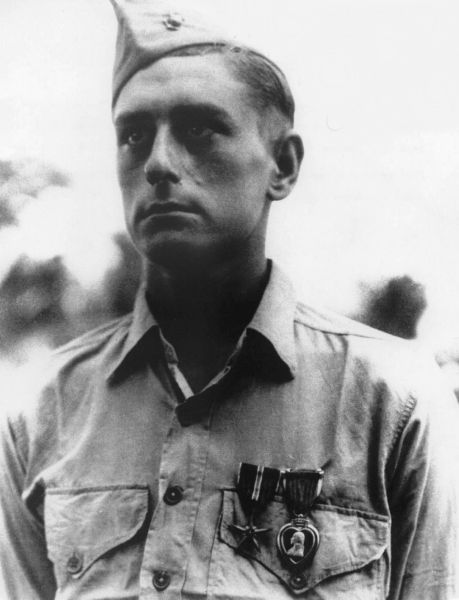Day, James Lewis
- Date of birth:
- October 5th, 1925 (East St. Louis/Illinois, United States)
- Date of death:
- October 28th, 1998 (Cathedral City/California, United States)
- Nationality:
- American
Biography
Do you have more information about this person? Inform us!
- Period:
- Second World War (1939-1945)
- Rank:
- Corporal
- Unit:
- Weapons Company, 2nd Battalion, 22nd Marine Regiment, 6th Marine Division "The Striking Sixth", U.S. Marine Corps
- Awarded on:
- January 20th, 1998
- Awarded for:
- Operation Iceberg
"For conspicuous gallantry and intrepidity at the risk of his life above and beyond the call of duty as a squad leader serving with the Second Battalion, Twenty-Second Marines, Sixth Marine Division, in sustained combat operations against Japanese forces on Okinawa, Ryukya Islands from 14 to 17 May 1945. On the first day, Corporal Day rallied his squad and the remnants of another unit and led them to a critical position forward of the front lines of Sugar Loaf Hill. Soon thereafter, they came under an intense mortar and artillery barrage that was quickly followed by a ferocious ground attack by some forty Japanese soldiers. Despite the loss of one-half of his men, Corporal Day remained at the forefront, shouting encouragement, hurling hand grenades, and directing deadly fire, thereby repelling the determined enemy. Reinforced by six men, he led his squad in repelling three fierce night attacks but suffered five additional Marines killed and one wounded, whom he assisted to safety. Upon hearing nearby calls for corpsman assistance, Corporal Day braved heavy enemy fire to escort four seriously wounded Marines, one at a time, to safety. Corporal Day then manned a light machine gun, assisted by a wounded Marine, and halted another night attack. In the ferocious action, his machine gun was destroyed, and he suffered multiple white phosphorous and fragmentation wounds. He reorganized his defensive position in time to halt a fifth enemy attack with devastating small arms fire. On three separated occasions, Japanese soldiers closed to within a few feet of his foxhole, but were killed by Corporal Day. During the second day, the enemy conducted numerous unsuccessful swarming attacks against his exposed position. When the attacks momentarily subsided, over 70 enemy dead were counted around his position. On the third day, a wounded and exhausted Corporal Day repulsed the enemy's final attack, killing a dozen enemy soldiers at close range. Having yielded no ground and with more than 100 enemy dead around his position, Corporal Day preserved the lives of his fellow Marines and made a significant contribution to the success of the Okinawa campaign. By his extraordinary heroism, repeated acts of valor, and quintessential battlefield leadership, Corporal Day inspired the efforts of his outnumbered Marines to defeat a much larger enemy force, reflecting great credit upon himself and upholding the highest traditions of the Marine Corps and the United States Naval Service."
- Period:
- Second World War (1939-1945)
- Rank:
- Corporal
- Unit:
- Weapons Company, 2nd Battalion, 22nd Marine Regiment, 6th Marine Division "The Striking Sixth", U.S. Marine Corps
- Period:
- Second World War (1939-1945)
- Rank:
- Corporal
- Unit:
- Weapons Company, 2nd Battalion, 22nd Marine Regiment, 6th Marine Division "The Striking Sixth", U.S. Marine Corps
- Period:
- Korean War (1950-1953)
- Rank:
- Second Lieutenant
- Unit:
- Reconnaissance Company, HQ Battalion, HQ, 1st Marine Division "The Old Breed", U.S. Marine Corps
- Period:
- Korean War (1950-1953)
- Rank:
- Second Lieutenant
- Unit:
- Reconnaissance Company, HQ Battalion, HQ, 1st Marine Division "The Old Breed", U.S. Marine Corps
Gold Star in lieu
- Period:
- Vietnam War (1955-1975)
- Rank:
- Major
- Unit:
- 1st Battalion, 9th Marine Regiment, 3rd Marine Division "Fighting Third", U.S. Marine Corps
Second Gold Star in lieu
- Period:
- Vietnam War (1955-1975)
- Rank:
- Major
- Unit:
- 1st Battalion, 9th Marine Regiment, 3rd Marine Division "Fighting Third", U.S. Marine Corps
With "Combat V" device
- Rank:
- Major General
- Period:
- Second World War (1939-1945)
- Period:
- Second World War (1939-1945)
- Period:
- Second World War (1939-1945)
- Period:
- Korean War (1950-1953)
- Period:
- Korean War (1950-1953)
- Period:
- Korean War (1950-1953)
- Period:
- Vietnam War (1955-1975)
- Period:
- Vietnam War (1955-1975)
Sources
- Photo 1: Bill Gonyo
- - HALLAS, J.H., Killing Ground on Okinawa, Naval Institute Press, Annapolis, Maryland, United States, 2007.
- JORDAN, K. N., SR., Yesterday's Heroes, Schiffer Publishing Ltd., Atglen, United States, 1996.
- The California State Military Museum
- James Day - Recipient - Military Times Hall Of Valor
















